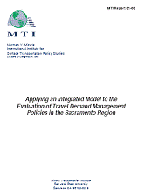- 408-924-7560
- mineta-institute@sjsu.edu
- Donate
Applying an Integrated Model to the Evaluation of Travel Demand Management Policies in the Sacramento Region
The Mineta Transportation Institute at San José State University conducted this study to review the issues and implications involved in the project in question.
The primary objective of this study was to use an advanced integrated land use and transportation model to evaluate transit and supportive land use and pricing policies; the Sacramento MEPLAN model was used to simulate these policies. The model represents the effect of changes in the transportation system on land use. If the land use and transportation interaction is not represented, then the analysis of transit and highway alternatives may be biased. For example, if the land used induced travel effect is not represented in a transit alternative, then vehicle miles traveled (VMT), congestion, and emissions may be overestimated and VMT, congestion, and emissions may be underestimated in a highway alternative. Moreover, the more comprehensive representation of induced travel effects in the Sacramento MEPLAN model increases sensitivity to policies such as transit, land use measures, and pricing policies.
The major findings for this case study in the Sacramento region are:
(1) The induced travel effects of changes in land use and trip distribution may be critical to accurate evaluation of transit and highway alternatives.
(2) Integrated land use and transportation models can provide important policy in sights.
(3) Land use intensification measures accompanied by supportive transit and/or pricing policies can produce comparatively large reductions in VMT and vehicle emission
ROBERT A. JOHNSTON
Robert A. Johnston is Professor of Environmental Science and Policy and a Faculty Researcher at the Institute of Transportation Studies at the University of California at Davis. Current consulting involves the evaluation of regional travel demand models for public and private clients, reviews of environmental assessments of large projects, and the development of methods for projecting environmental carrying capacity at the national level.
Johnston's current research projects include the evaluation of transportation policies using advanced regional travel demand models. The mode choice models have been modified to permit the projection of traveler net benefits (surplus) for each scenario, broken down by household income class. He also is performing research using an integrated urban model of the Sacramento region. This model simulates land markets and travel behavior, which permits the projection of the interactions between land uses and travel demand. This model allows the assessment of locator surplus, by household income class.
Related projects are the linking of the integrated urban model to a GIS-based model, which produced detailed land use maps. These maps are then used with other data layers to perform environmental impact assessments. Another project is a comparison of three integrated urban models on the same datasets for the Sacramento region.
Recently completed work includes financial and economic evaluations of regional transportation alternatives, including ITS roadway and transit scenarios. Current work includes performing long-range (50-year) analyses of sustainable development scenarios for the Sacramento region using an urban model and GIS, in conjunction with business and citizens groups. He is also adapting the GIS to make it interactive and run on a PC, for single-county land development scenario testing.
Professor Johnston sits on state and regional advisory committees for transportation and air quality planning agencies and has been a member of a local transportation commission. He reviews articles and grant proposals for several organizations and has published over 60 refereed articles and book chapters. He has given invited talks at many conferences and universities and has been a faculty member-in-residence at the University of Iowa. He is a member of the TRB Transportation and Land Development Committee and heads the Sustainable Communities Consortium at UC Davis.
-
Contact Us
San José State University One Washington Square, San Jose, CA 95192 Phone: 408-924-7560 Email: mineta-institute@sjsu.edu






